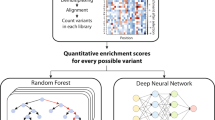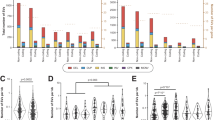Abstract
More than 1100 genetic loci have been correlated with drug response outcomes but disproportionately few have been translated into clinical practice. One explanation for the low rate of clinical implementation is that the majority of associated variants may be in linkage disequilibrium (LD) with the causal variants, which are often elusive. This study aims to identify and characterize likely causal variants within well-established pharmacogenomic genes using next-generation sequencing data from the 1000 Genomes Project. We identified 69,319 genetic variations within 160 pharmacogenomic genes, of which 8207 variants are in strong LD (r2>0.8) with known pharmacogenomic variants. Of the latter, eight are coding or structural variants predicted to have high impact, with 19 additional missense variants that are predicted to have moderate impact. In conclusion, we identified putatively functional variants within known pharmacogenomics loci that could account for the association signals and represent the missing causative variants underlying drug response phenotypes.
This is a preview of subscription content, access via your institution
Access options
Subscribe to this journal
Receive 6 print issues and online access
$259.00 per year
only $43.17 per issue
Buy this article
- Purchase on Springer Link
- Instant access to full article PDF
Prices may be subject to local taxes which are calculated during checkout


Similar content being viewed by others
References
Evans WE, Relling MV. Moving towards individualized medicine with pharmacogenomics. Nature. 2004;429:464–8.
Giacomini KM, Yee SW, Ratain MJ, Weinshilboum RM, Kamatani N, Nakamura Y. Pharmacogenomics and patient care: one size does not fit all. Sci Transl Med. 2012;4:153ps18
Evans WE, Relling MV. Pharmacogenomics: translating functional genomics into rational therapeutics. Science. 1999;286:487–91.
Hewett M, Oliver DE, Rubin DL, Easton KL, Stuart JM, Altman RB, et al. PharmGKB: the pharmacogenetics knowledge base. Nucleic Acids Res. 2002;30:163–5.
Shuldiner AR, Relling MV, Peterson JF, Hicks K, Freimuth RR, Sadee W, et al. The Pharmacogenomics Research Network Translational Pharmacogenetics Program: overcoming challenges of real-world implementation. Clin Pharmacol Ther. 2013;94:207–10.
Relling MV, Klein TE. CPIC: Clinical Pharmacogenetics Implementation Consortium of the Pharmacogenomics Research Network. Clin Pharmacol Ther. 2011;89:464–7.
Johnson JA, Gong L, Whirl-Carrillo M, Gage BF, Scott SA, Stein CM, et al. Clinical Pharmacogenetics Implementation Consortium guidelines for CYP2C9 and VKORC1 genotypes and warfarin dosing. Clin Pharmacol Ther. 2011;90:625–9.
Jaffer A, Bragg L. Practical tips for warfarin dosing and monitoring. Cleve Clin J Med. 2003;70:361–71.
Takeuchi F, McGinnis R, Bourgeois S, Barnes C, Eriksson N, Soranzo N, et al. A genome-wide association study confirms VKORC1, CYP2C9, and CYP4F2 as principal genetic determinants of warfarin dose. PLoS Genet. 2009;5:e1000433.
Soranzo N, Cavalleri GL, Weale ME, Wood NW, Depondt C, Marguerie R, et al. Identifying candidate causal variants responsible for altered activity of the ABCB1 multidrug resistance gene. Genome Res. 2004;14:1333–44.
Wechsler ME, Israel E. How pharmacogenomics will play a role in the management of asthma. Am J Respir Crit Care Med. 2005;172:12–18.
Zhang W, Dolan ME. Impact of the 1000 genomes project on the next wave of pharmacogenomic discovery. Pharmacogenomics. 2010;11:249–56.
Van den Broeck T, Joniau S, Clinckemalie L, Helsen C, Prekovic S, Spans L et al. The role of single nucleotide polymorphisms in predicting prostate cancer risk and therapeutic decision making. Biomed Res Int. 2014; 2014. https://doi.org/10.1155/2014/627510.
Whirl-Carrillo M, McDonagh EM, Hebert JM, Gong L, Sangkuhl K, Thorn CF, et al. Pharmacogenomics knowledge for personalized medicine. Clin Pharmacol Ther. 2012;92:414–7.
The 1000 Genomes Project Consortium. A global reference for human genetic variation. Nature. 2015;526:68–74.
Cingolani P, Platts A, Wang le L, Coon M, Nguyen T, Wang L. et al. A program for annotating and predicting the effects of single nucleotide polymorphisms, SnpEff: SNPs in the genome of Drosophila melanogaster strainw1118; iso-2; iso-3. Fly. 2012;6:80–92.
Iacobucci I, Lonetti A, Candoni A, Sazzini M, Papayannidis C, Formica S, et al. Profiling of drug-metabolizing enzymes/transporters in CD33+acute myeloid leukemia patients treated with Gemtuzumab-Ozogamicin and Fludarabine, Cytarabine and Idarubicin. Pharm J. 2013;13:335–41.
Mancinelli L, Cronin M, Sadée W. Pharmacogenomics: the promise of personalized medicine. AAPS J. 2000;2:29–41.
Karolchik D, Hinrichs AS, Furey TS, Roskin KM, Sugnet CW, Haussler D, et al. The UCSC Table Browser data retrieval tool. Nucleic Acids Res. 2004;32:D493–6.
Purcell S, Neale B, Todd-Brown K, Thomas L, Ferreira MAR, Bender D, et al. PLINK: A tool set for whole-genome association and population-based linkage analyses. Am J Hum Genet. 2007;81:559–75.
Boyle AP, Hong EL, Hariharan M, Cheng Y, Schaub MA, Kasowski M, et al. Annotation of functional variation in personal genomes using RegulomeDB. Genome Res. 2012;22:1790–7.
Edgar R. Gene Expression Omnibus: NCBI gene expression and hybridization array data repository. Nucleic Acids Res. 2002;30:207–10.
Consortium EP, Dunham I, Kundaje A, Aldred SF, Collins PJ, Davis Ca, et al. Integr Encycl DNA Elem Human Genome Nat. 2012;489:57–74.
Cariaso M, Lennon G. SNPedia: a wiki supporting personal genome annotation, interpretation and analysis. Nucleic Acids Res. 2012;40:D1308–12.
Acknowledgements
We would like to thank Dr. Alan R. Shuldiner and support from the Translational Pharmacogenomics Project. This manuscript was supported by NIH grants U01 HL65899, U01 HL105198, and K99 HL116651. Computations were performed on resources and with support provided by the Centre for Advanced Computing (CAC) at Queen’s University in Kingston, Ontario. The CAC is funded by the Canada Foundation for Innovation, the Government of Ontario, and Queen’s University. QLD receives funding from the Canadian Institutes of Health Research and Queen’s University.
Author contribution
All authors contributed to the writing of the manuscript. JC performed the data analyses and drafted the manuscript. QLD supervised data analyses and assisted in the writing of the manuscript. QLD and KGT designed the research project.
Author information
Authors and Affiliations
Corresponding author
Ethics declarations
Conflict of interest
The authors declare that they have no conflict of interest.
Rights and permissions
About this article
Cite this article
Choi, J., Tantisira, K.G. & Duan, Q.L. Whole genome sequencing identifies high-impact variants in well-known pharmacogenomic genes. Pharmacogenomics J 19, 127–135 (2019). https://doi.org/10.1038/s41397-018-0048-y
Received:
Revised:
Accepted:
Published:
Issue Date:
DOI: https://doi.org/10.1038/s41397-018-0048-y



